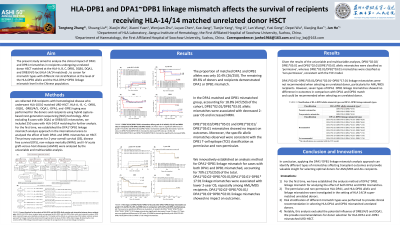(P414) HLA-DPB1 and DPA1~DPB1 linkage mismatch affects the survival of recipients receiving HLA-14/14 matched unrelated donor HSCT
Location: Platinum Ballroom

Poster Presenter(s)
Aim: The effect of HLA-DPA1 and -DPB1 alleles and HLA-DPA1~DPB1 linkage mismatches on the outcomes of transplantation was investigated in hematopoietic stem cell transplantation donors and recipients matched at the HLA-A, B, C, DRB1, DQB1, DQA1, and DRB3/4/5 loci (HLA-14/14 matched).
Method: we collected 258 recipients with hematological disease who underwent HLA-10/10 matched URD-HSCT. HLA-A, -B, -C, -DRB1, -DQB1, -DRB3/4/5, -DQA1, -DPA1, and -DPB1 typing was performed for the donors and recipients using hybrid-capture next-generation sequencing (NGS)-based technology. After excluding 8 cases with DQA1 or DRB3/4/5 mismatches, we included 250 cases with HLA-14/14 matching for further analysis. For the first time, we established the DPA1~DPB1 linkage mismatch analysis approach in the international arena to analyzed the effect of both DPA1 and DPB1 mismatches on HSCT. The primary outcomes for 2-year overall survival (OS), disease free survival (DFS), non-relapse mortality (NRM), and II-IV acute graft-versus-host disease (aGVHD) were analyzed by the univariable and multivariable analysis.
Results: Our results showed that the proportion of matched DPA1 and DPB1 alleles was only 10.4% (26/250). The remaining 89.6% of donors and recipients demonstrated DPA1 or DPB1 mismatch. In the DPA1 matched and DPB1 mismatched group, accounting for 18.8% (47/250) of the cohort, DPB1*02:01/DPB1*03:01 allelic mismatches were associated with decreased 2-year OS and increased NRM. DPB1*02:02/DPB1*05:01 and DPB1*02:01/DPB1*05:01 mismatches showed no impact on outcomes. Moreover, the specific allelic mismatches observed were consistent with the DPB1 T-cell epitope (TCE) classification as permissive and non-permissive. We innovatively established an analysis method for DPA1~DPB1 linkage mismatch for cases with both DPA1 and DPB1 mismatched, accounting for 70% (175/250) of the total. DPA1*02:02~DPB1*05:01/DPA1*02:01~DPB1*17:01 linkage mismatches were associated with lower 2-year OS, especially among AML/MDS recipients. DPA1*02:02~DPB1*05:01/DPA1*01:03~DPB1*02:01 linkage mismatches showed no impact on outcomes.
Conclusion: In Conclusion, applying the DPA1~DPB1 linkage mismatch analysis approach can identify different types of mismatches affecting transplant outcomes and provide valuable insight for selecting optimal donors for AML/MDS and ALL recipients.
Method: we collected 258 recipients with hematological disease who underwent HLA-10/10 matched URD-HSCT. HLA-A, -B, -C, -DRB1, -DQB1, -DRB3/4/5, -DQA1, -DPA1, and -DPB1 typing was performed for the donors and recipients using hybrid-capture next-generation sequencing (NGS)-based technology. After excluding 8 cases with DQA1 or DRB3/4/5 mismatches, we included 250 cases with HLA-14/14 matching for further analysis. For the first time, we established the DPA1~DPB1 linkage mismatch analysis approach in the international arena to analyzed the effect of both DPA1 and DPB1 mismatches on HSCT. The primary outcomes for 2-year overall survival (OS), disease free survival (DFS), non-relapse mortality (NRM), and II-IV acute graft-versus-host disease (aGVHD) were analyzed by the univariable and multivariable analysis.
Results: Our results showed that the proportion of matched DPA1 and DPB1 alleles was only 10.4% (26/250). The remaining 89.6% of donors and recipients demonstrated DPA1 or DPB1 mismatch. In the DPA1 matched and DPB1 mismatched group, accounting for 18.8% (47/250) of the cohort, DPB1*02:01/DPB1*03:01 allelic mismatches were associated with decreased 2-year OS and increased NRM. DPB1*02:02/DPB1*05:01 and DPB1*02:01/DPB1*05:01 mismatches showed no impact on outcomes. Moreover, the specific allelic mismatches observed were consistent with the DPB1 T-cell epitope (TCE) classification as permissive and non-permissive. We innovatively established an analysis method for DPA1~DPB1 linkage mismatch for cases with both DPA1 and DPB1 mismatched, accounting for 70% (175/250) of the total. DPA1*02:02~DPB1*05:01/DPA1*02:01~DPB1*17:01 linkage mismatches were associated with lower 2-year OS, especially among AML/MDS recipients. DPA1*02:02~DPB1*05:01/DPA1*01:03~DPB1*02:01 linkage mismatches showed no impact on outcomes.
Conclusion: In Conclusion, applying the DPA1~DPB1 linkage mismatch analysis approach can identify different types of mismatches affecting transplant outcomes and provide valuable insight for selecting optimal donors for AML/MDS and ALL recipients.

